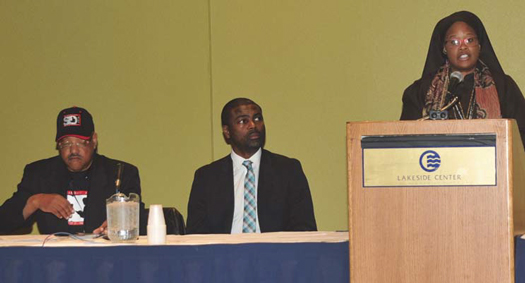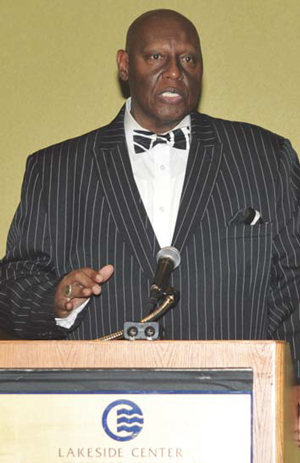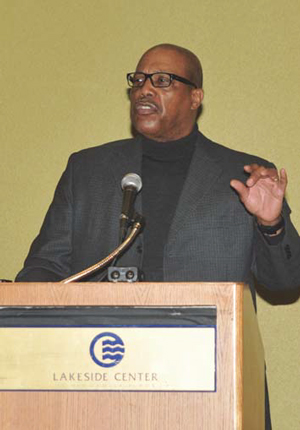Prison Ministry workshop focuses on flaws in child support system
By Rhodesia Muhammad -Contributing Writer- | Last updated: Mar 21, 2018 - 2:21:27 PMWhat's your opinion on this article?

L-R: Barney Muhammad, Illinois State Representative LaShawn K. Ford, Audrey Muhammad, moderator.
|
As part of the 2018 Saviours’ Day convention, the Nation of Islam National Prison Reform Ministry hosted a workshop, Saturday, February 24, titled, “The Issue of Child Support and Exorbitant Interest Rates and its Impact on the Incarcerated and Formerly-Incarcerated: Separation is the Only Solution.”
The workshop was filled with Believers from the NOI, folks from the community, and many who had been formerly incarcerated. Panelists included Student National Prison Reform Minister Abdullah Muhammad; Barney Muhammad, Fruit of Islam Elite 50 advocacy minister; Anthony Lowery, associate vice president community Housing Programs; La Shawn K. Ford, state representative 8th District State of Illinois; and a special digital presentation from Mumia Abu Jamal, political prisoner, activist, and journalist.

Student National Prison Reform Minister Abdullah Muhammad
|
Walter Scott, a father of four, was killed last spring by police in North Charleston, South Carolina. According to his family, he was likely running from an arrest warrant because of an unpaid child support order, Minister Abdullah Muhammad said. News reports stated that he owed $6,800 in child support payments and had been jailed previously for failure to pay. After his release from jail, Mr. Scott’s child support debt was over $25,000 because of the interest rate. He was in debt at the time of his death.
Illinois State Representative La Shawn K. Ford said the goal is to make sure that the fathers that could pay child support pay it. But for those that are unable to pay because they’re incarcerated without the ability to work to pay for child support, their child support should be suspended, and the interest should be stopped, he argued.
“Right now, there’s a 30 percent interest rate that the state charges inmates for child support payments when they’re not making the payments,” said Rep. Ford. “So, if they charge a predatory rate for men that’s incarcerated when they know they have no ability to pay and they continue to add interest, it becomes a compounding interest, and it causes the inmate to become deeper in debt.”
Not only is the state compounding interest at a predatory rate, he stated, while the person is locked up, they’re actually still breaking the law because it’s against the law to not pay child support. So, the moment they get out of jail they can automatically be sent right back to jail.
Anthony Lowery, director of policy and advocacy at the Safer Foundation, provides services to people with criminal records. Being a person with a criminal record himself, he understands the criminal justice system and says he wants others to understand the conditions, understand where we’re at and try and go a different route through policy and advocacy.
“Discrimination is etched in the DNA of every American,” he noted. “Every prison I go into, 60 to 80 percent of the population are Black. Something is fundamentally wrong in America when a 14-year-old thinks his best opportunity for economic freedom is to do a car-jacking right down the street. Or a woman with a 30 year old misdemeanor conviction can’t get a job as a certified nursing assistant.”

Anthony Lowry of the Safer Foundation.
|
That’s the real punishment, Mr. Lowery asserted, when you get out of prison and can’t get a job.
Barney Muhammad shared his experience of how the child support system impacted his life.
What he describes as the weaponization of child support or the child support hustle left him with exorbitant interest rates that began with him owing a few thousand dollars that morphed into $27,000.
“The system that I was victimized by is in need of an overhaul so that it will help the children and not hurt the custodial and non-custodial parent,” he said.
Mr. Barney Muhammad worked as a security guard and was paying his child support, however, for 10 months his employer was sending the payments to the wrong agency, he said. As a result, his work license was suspended, and he couldn’t get it reinstated until he paid an exorbitant amount every week even though he had been unable to work. The ordeal impacted his ability to provide for his family. Although it wasn’t his mistake, he was left paying for it.
“The intent of this workshop,” he expressed, “is for it to be a deliberative dialogue to begin the process of calling the lawmakers back to the table to take a second look at this law. The solution is to re-examine this child support system. On the other end, we as independent organizations have to then begin to develop foundations to help our incarcerated, formerly incarcerated, seniors and others by helping them be able to get attorney’s to follow processes and go to court to help them do that so that they can get those child support payments modified because many of them don’t know they can do that.”
Mr. Lowery says there are two solutions: legislators tweaking their system and changing laws, and our organizations pooling our resources and coming together to help those in need.
Minister Abdullah Muhammad said there’s only one solution … separation. “It’s the only solution because only then can we make man in the image and likeness of Allah God by teaching what a father is without being hindered by our enemies.”
State Representative La Shawn K. Ford is working diligently to get Illinois House Bill 0236 passed, which in part, provides that subject to federal approval, a person’s obligation to pay child support pursuant to a court or administrative order is suspended by operation of law during any period that the person is committed to the custody of the Department of Corrections or the Department of Juvenile Justice.
INSIDE STORIES AND REVIEWS
-
-
About Harriett ... and the Negro Hollywood Road Show
By Rabiah Muhammad, Guest Columnist » Full Story -
Skepticism greets Jay-Z, NFL talk of inspiring change
By Bryan 18X Crawford and Richard B. Muhammad The Final Call Newspaper @TheFinalCall » Full Story -
The painful problem of Black girls and suicide
By Charlene Muhammad -National Correspondent- » Full Story -
Exploitation of Innocence - Report: Perceptions, policies hurting Black girls
By Charlene Muhammad -National Correspondent- » Full Story -
Big Ballin: Big ideas fuel a father’s Big Baller Brand and brash business sense
By Bryan Crawford -Contributing Writer- » Full Story






 Click Here Stay Connected!
Click Here Stay Connected!








